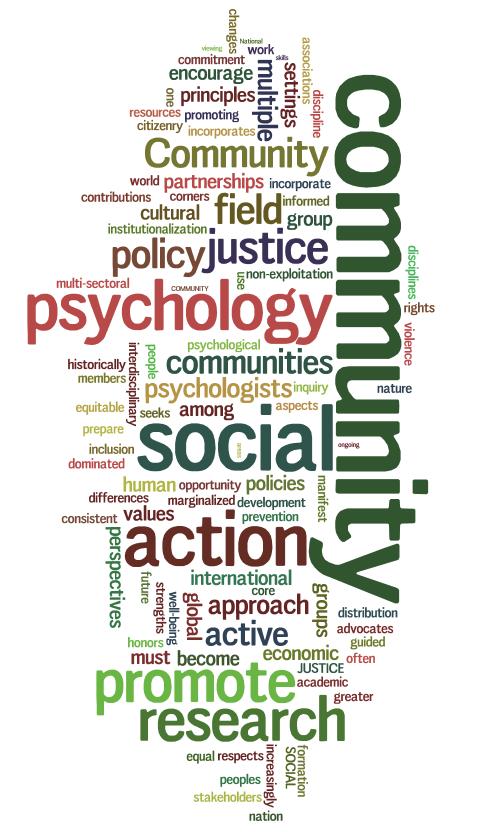UNC Charlotte's Community Psychology Training Program is the recipient of the 2013 Excellence in Education Award, from the Society for Community Research and Action, 1 of 4 programs in the nation to receive this prestigious award.
The Community Psychology Training Program is comprised of 3 separate but related components, which provide education in community psychology for students at different levels. Each component is very applied in nature, helping students develop community based research and practice skills, which enable them to make a difference in their communities. The 3 components are:
· Ph.D. specializing in Community Psychology, within the Health Psychology Ph.D. Program
· M.A. in Psychology specializing in Community Psychology
· Community Psychology Learning Community for undergraduate transfer students

If you are:
- Concerned about social justice and making sure that opportunities exist for everyone to succeed
- Wanting to use your talents to make a difference in the community
- Interested in gaining applied skills that can enable you to effect community change
Then Community Psychology may be of interest to you.
To learn more about Community Psychology generally see:
“Graduate Degree Overview: Community Psychology” at the Public Service Graduate Education Resource Center at Idealist.org.
“Community Psychology: Using the ‘Big Picture’ Perspective to Help People” in Eye on Psi Chi, by Pia Stanard
Society for Community Research and Action (SCRA) is the international organization of community psychologists
At all levels, our training program examines social and community factors that contribute to healthy outcomes in individuals, and develops community interventions to create stronger, healthier communities. Students develop applied research and intervention skills that enable them to effect change in settings and communities. With an emphasis on social justice and community partnerships, students work to improve the health and well-being of disenfranchised individuals and families.
For more information, contact Community Psychology program Faculty:
 Jim Cook
Jim Cook
jcook@uncc.edu
704-687-1327
Ph.D. 1975, Indiana University
My area of research within community psychology focuses on changing systems and settings to better meet the needs of individuals and families. With a strong emphasis on community-based participatory research (CBPR), my faculty and student colleagues and I work with community groups as partners. Together, we develop research questions, collect data, and use the knowledge gained to improve the community. Examples of current partnerships (with Ryan Kilmer) include: evaluation of early intervention programs within schools and helping child protective services improve their ability to meet the needs of children in foster care. Working with these programs, we help them increase their capacity to help families be successful and to help children thrive. We currently have funding from the Institute of Educational Science to help our local school system develop a greater capacity to collect, manage and use data, and to develop an enhanced coaching model using those data to increase the impact of their pre-kindergarten program.
 Ryan Kilmer
Ryan Kilmer
rpkilmer@uncc.edu
704-687-1340
Ph.D. 1999, University of Rochester
I am a child clinical-community psychologist and work with faculty and students on a host of applied research efforts in community psychology. My interests include: (a) factors influencing the development of children at-risk for emotional, behavioral, and/or academic difficulties, particularly risk and resilience and youngsters’ adjustment to trauma; and (b) the use of research to guide service delivery, evaluate service and program effectiveness, and inform system change, program refinement, and policy. I collaborate regularly with Jim Cook on work with a range of community partners reflecting different disciplines (e.g., mental health, education, health, child welfare). I have directed or co-directed NIH-funded projects involving children exposed to adversity and at-risk youth (i.e., Awards 1R03MH065596-01A2,1R03MH078197-01,1R21MH083088-01A1). , and co-direct a large-scale evaluation of the implementation and impact of a child mental health service delivery model, as well as evaluations of family support programs in mental health and child welfare contexts, and two community initiatives to increase school readiness. We have used project data from work with various populations with mental health needs to detail needs for services and supports (and the impact of unmet needs), frame recommendations for service system change, and discuss warranted policy modifications and their implications.
 Victoria Scott
Victoria Scott
vscott10@uncc.edu
704-687-1354
http://www.collectivewellnesslab.com/
Ph.D., MBA, 2011, University of South Carolina
Individual wellness is linked to the well-being of our society, including the environments in which we live, work, and play. I am a community psychologist committed to social improvement. I believe social improvement efforts need to be of, by, and for the community. My work involves collaborating with students, researchers, and community members to cultivate a more equitable, justice, healthy, and compassionate society. Using an ecological perspective nested in the fields of implementation and improvement science, my research team and I study the relationship between individuals and their environments to understand the complexity and determinants of individual and organizational improvement. What hinders, postpones, and propels improvement? How can we give research “feet” so that it can be more useful in community settings? Our laboratory is the real-world. Our work is highly applied and action-oriented. We take what we learn from research and give it back to the community to improve the status quo. Our broad mission is to promote collective wellness (i.e., wellness of all individuals and communities). Within this mission, we are particularly committed to reducing health disparities and promoting health equity. To learn more about us and our work, visit our webpage at http://www.collectivewellnesslab.com/.
 Andrew Case
Andrew Case
acase8@uncc.edu
704-687-1337
Ph.D. 2014, University of Illinois, Urbana-Champaign
My work focuses broadly on issues of racial equity. Through basic and applied research, I seek to: (a) identify the causes of racial disparities in health and life outcomes; and, (b) support community-driven strategies that reduce these disparities. One line of my current research is focused on examining community and societal risk factors (e.g., poverty and discrimination) that underlie the disproportionate disease burden experienced by African Americans in reference to cardiovascular disease. A second line of my research utilizes ethnographic and participatory research to address factors within organizations and communities that underlie racial disparities in health and life outcomes. Current investigations focus on empowerment as an anti-poverty strategy and empowering counterspaces as a means reducing juvenile offending and incarceration among racial minority youth.
See Training in Community Psychology for more information about the types of experiences available and the accomplishments of the Community Psychology faculty and students.
Also see the program’s Facebook Page at: https://www.facebook.com/CommunityPsychologyatUNCC





